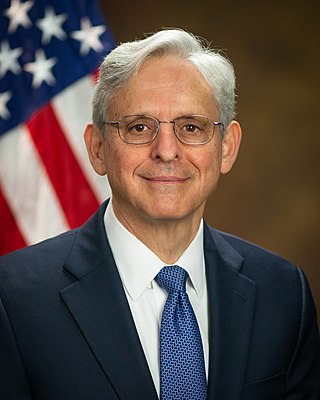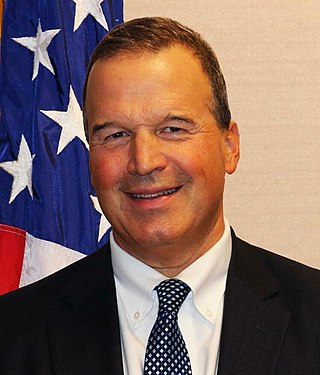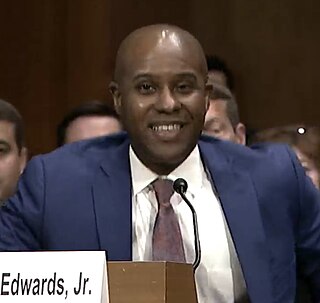Related Research Articles

The United States Court of Appeals for the Fourth Circuit is a federal court located in Richmond, Virginia, with appellate jurisdiction over the district courts in the following districts:

The United States Court of Appeals for the Sixth Circuit is a federal court with appellate jurisdiction over the district courts in the following districts:

The United States Court of Appeals for the Tenth Circuit is a federal court with appellate jurisdiction over the district courts in the following districts:

Merrick Brian Garland is an American lawyer and jurist who has served as the 86th United States attorney general since 2021. He previously served as a circuit judge of the United States Court of Appeals for the District of Columbia Circuit from 1997 to 2021. In 2016, President Barack Obama nominated Garland to the U.S. Supreme Court, but the U.S. Senate refused to hold a vote to confirm him.
The appointment of federal judges for United States federal courts is done via nomination by the President of the United States and confirmation by the United States Senate. The tables below provide the composition of all Article III courts which include the Supreme Court and the Courts of Appeals at the end of each four year presidential term, as well as the current compositions of the District Courts and the Court of International Trade, categorizing the judges by the presidential term during which they were first appointed to their seats.

The Judiciary Act of 1869, formally An Act to amend the Judicial System of the United States and is sometimes called the Circuit Judges Act of 1869. It provided that the Supreme Court of the United States would consist of the chief justice of the United States and eight associate justices. It established separate judgeships for the U.S. circuit courts, and for the first time included a provision allowing federal judges to retire without losing their salary. This is the most recent legislation altering the size of the Supreme Court. The Act was signed by President Ulysses S. Grant.
The Government of Guam (GovGuam) is a presidential representative democratic system, whereby the president is the head of state and the governor is head of government, and of a multi-party system. Guam is an organized, unincorporated territory of the United States with policy relations between Guam and the US under the jurisdiction of the Office of Insular Affairs.

Lucy Haeran Koh is an American lawyer serving as a United States circuit judge of the United States Court of Appeals for the Ninth Circuit. Koh previously served as a United States district judge of the United States District Court for the Northern District of California from 2010 to 2021. She also served as a California state court judge of the Santa Clara County Superior Court from 2008 to 2010. She is the first Korean American woman to serve on a federal appellate court in the United States.
U.S. President Barack Obama nominated over 400 individuals for federal judgeships during his presidency. Of these nominations, Congress confirmed 329 judgeships, 173 during the 111th & 112th Congresses and 156 during the 113th and 114th Congresses.

Luis Felipe Restrepo, known commonly as L. Felipe Restrepo, is a United States circuit judge of the United States Court of Appeals for the Third Circuit and former United States district judge of the United States District Court for the Eastern District of Pennsylvania. He is a member of the United States Sentencing Commission.

Ryan Wesley Bounds is an American attorney serving as an Assistant United States Attorney for the District of Oregon.
Donald Trump, President of the United States from 2017 to 2021, entered office with a significant number of judicial vacancies, including a Supreme Court vacancy due to the death of Antonin Scalia in February 2016. During the first eight months of his presidency, he nominated approximately 50 judges, a significantly higher number than any other recent president had made by that point in his presidency. By June 24, 2020, 200 of his Article III nominees had been confirmed by the United States Senate. According to multiple media outlets, Trump significantly impacted the composition of the Supreme Court and lower courts during his tenure.

Paul Brian Matey is an American attorney who serves as a United States circuit judge of the United States Court of Appeals for the Third Circuit. Prior to Matey's judicial service, he was a partner in the White Collar Criminal Defense and Litigation practice groups at the law firm of Lowenstein Sandler LLP. He was previously Senior Vice President, General Counsel, and Secretary at University Hospital in Newark, New Jersey.
President Joe Biden began his presidency with fewer vacancies to fill than his predecessor. He pledged to nominate people with diverse backgrounds and professional experience; further he pledged to nominate the first black woman to the Supreme Court of the United States.

Stephen Henley Locher is an American lawyer who has served as a United States district judge of the United States District Court for the Southern District of Iowa since 2022. He previously served as a United States magistrate judge of the same court from 2021 to 2022.

Nancy Lee Maldonado is an American lawyer from Chicago who has served as a United States circuit judge of the United States Court of Appeals for the Seventh Circuit since 2024. She previously served as a United States district judge of the United States District Court for the Northern District of Illinois from 2022 to 2024.

Julia Eleanor Kobick is an American lawyer who has served as a United States district judge of the United States District Court for the District of Massachusetts since 2023. She previously served as deputy state solicitor in the Office of the Massachusetts Attorney General.

Jerry Edwards Jr. is an American lawyer from Louisiana who has served as a United States district judge of the United States District Court for the Western District of Louisiana since 2023. He previously served as the first assistant U.S. attorney in the U.S. Attorney's Office for the Western District of Louisiana from 2022 to 2023.
The Federal Magistrates Act of 1968 was enacted by Congress to reform and modernize the federal judiciary. Its primary objective was to create the position of magistrate judges to handle minor judicial functions, easing the workload of district court judges.
References
- ↑ "Trump, Biden, and the battle over judges: Vacancies and retirements". The Washington Post. 2024-12-24. Retrieved 2024-12-31.
- ↑ "Biden delivers on threat to veto bill to expand US judiciary" . Retrieved 2024-12-31.
- ↑ "Biden vetoes bill to add 66 federal judges, likely fearing Trump appointments" . Retrieved 2024-12-31.
- ↑ "US judiciary's leadership laments Biden's veto of bill to add judges" . Retrieved 2024-12-31.
- ↑ "Biden delivers on threat to veto bill to expand US judiciary" . Retrieved 2024-12-31.
- ↑ "Trump, Biden, and the battle over judges: Vacancies and retirements". The Washington Post. 2024-12-24. Retrieved 2024-12-31.
This article needs additional or more specific categories .(January 2025) |